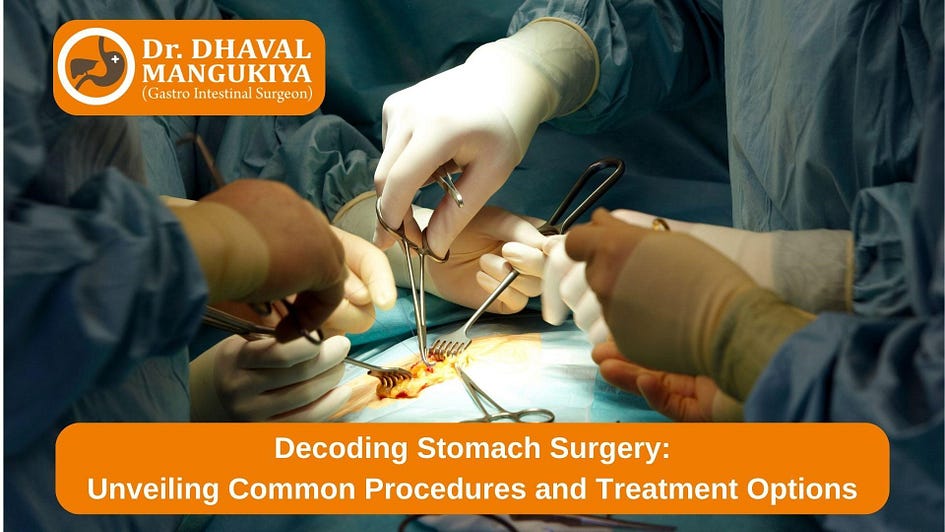Decoding Stomach Surgery With the Best Laparoscopic Surgeon In Surat: Unveiling Common Procedures and Treatment Options

Gastrointestinal issues don’t generally need stomach surgery. But for some conditions, stomach surgery is the need of the hour. From alleviating chronic conditions to aiding weight loss, these procedures offer a spectrum of solutions. Therefore, understanding stomach surgery is paramount for informed decision-making regarding treatment options and outcomes. In this blog, Dr Dhaval Mangukiya, well-known as one of the best gastrointestinal surgeons in Surat, shares the intricacies of common stomach surgeries, shedding light on procedures like gastric bypass, sleeve gastrectomy, gastric banding, and revisional surgery.
Gastric Bypass: Redefining Digestive Pathways
Gastric bypass surgery, a cornerstone of bariatric procedures, redefines the digestive pathway to promote weight loss. In this procedure, the surgeon creates a smaller stomach pouch and reroutes a portion of the small intestine, thereby limiting food intake and nutrient absorption. This dual mechanism not only curtails the amount of food one can consume but also alters the hormonal signals that regulate hunger and satiety.
“Gastric bypass reduces the stomach’s capacity and bypasses a segment of the intestine to facilitate significant weight loss and often leads to improvements in conditions like type 2 diabetes and hypertension.”, says Dr Dhaval. However, it necessitates lifelong dietary modifications and regular medical follow-ups to optimize outcomes and mitigate potential complications.
Sleeve Gastrectomy: Restructuring the Stomach
Another prominent weight loss surgery is sleeve gastrectomy. This surgery involves the removal of a large portion of the stomach, leaving behind a banana-shaped sleeve. By reducing the stomach’s size, sleeve gastrectomy restricts food intake while preserving the natural digestive process, thus offering a balance between efficacy and digestive function.
Sleeve gastrectomy not only promotes weight loss but also exhibits favourable outcomes in resolving obesity-related comorbidities. The best gastrointestinal surgeons in Surat, including Dr Dhaval Mangukiya, prefer this surgery for their patients for its relatively simpler technique and lower risk profile for patients seeking surgical intervention for weight management.
Gastric Banding: Modulating Stomach Volume
Gastric banding, also known as laparoscopic adjustable gastric banding, entails the placement of an inflatable band around the upper portion of the stomach, creating a small pouch. Adjusting the band’s tightness through a subcutaneous port, the surgeon can regulate the passage of food, thereby controlling the amount consumed and promoting gradual weight loss.
This minimally invasive procedure offers the advantage of adjustability and reversibility, making it an appealing option for patients seeking a less invasive approach to weight loss. However, the best gastro surgeons in Surat suggest regular band adjustments for patients. Also, it may entail complications such as band slippage or erosion, necessitating vigilant postoperative management.
Revisional Surgery: Navigating Surgical Modifications
In some cases, individuals who have undergone previous stomach surgeries may require revisional procedures to address complications or optimize outcomes. Revisional surgery encompasses a range of interventions, including converting one procedure to another, repairing anatomical alterations, or addressing functional issues arising from prior surgeries.
While revisional surgery poses unique challenges due to the altered anatomical landscape and scar tissue formation, advancements in surgical techniques and perioperative care have enhanced its safety and efficacy. Comprehensive evaluation and individualized treatment plans are paramount in navigating the complexities of revisional stomach surgery.
Non-Surgical Alternatives: Exploring Conservative Approaches
The best stomach surgeons in Surat, such as Dr Dhaval Mangukiya, recommend opting for a range of non-surgical options for managing gastrointestinal disorders and promoting weight loss. Dr Dhaval, being one of the best gastrointestinal surgeons in Surat says, “Surgery can be opted when there is a life-threatening issue for the patient. However, it is essential to explore non-surgical options first.” From dietary modifications and behavioural therapy to pharmacological interventions and endoscopic procedures, these conservative approaches offer a multifaceted approach to addressing diverse patient needs and preferences.
While non-surgical alternatives may not yield dramatic weight loss or anatomical modifications akin to surgical procedures, they play a crucial role in augmenting lifestyle changes, managing comorbidities, and preparing patients for potential surgical interventions. Moreover, they serve as valuable adjuncts in long-term weight management and postoperative care.
Conclusion:
Stomach surgery encompasses a spectrum of procedures tailored to address diverse medical conditions and patient needs. From gastric bypass and sleeve gastrectomy to gastric banding and revisional surgery, each intervention offers a unique approach to promoting weight loss, resolving gastrointestinal disorders, and improving overall health outcomes. However, non-surgical alternatives complement surgical interventions, providing a holistic framework for comprehensive patient care. It is crucial to understand the nuances of stomach surgery and treatment options so that patients can navigate this complex landscape to achieve optimal outcomes and enhance quality of life.
Comments
Post a Comment